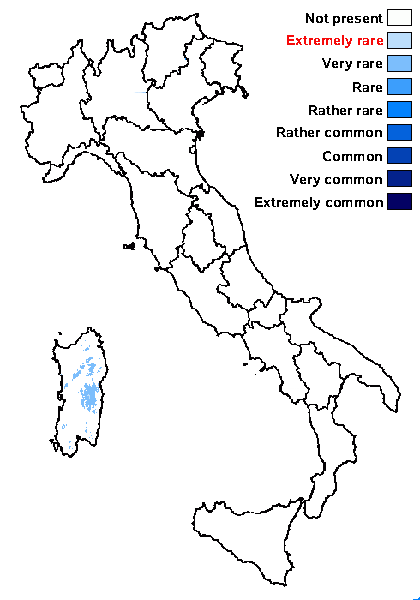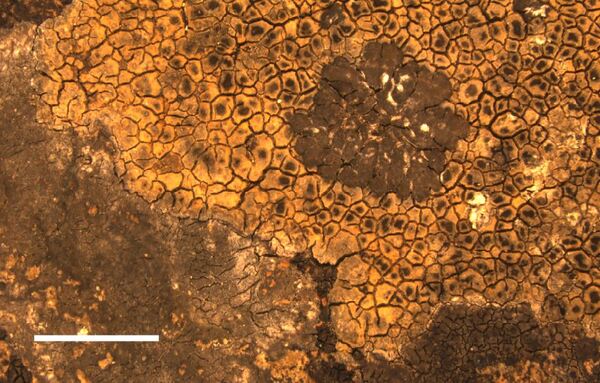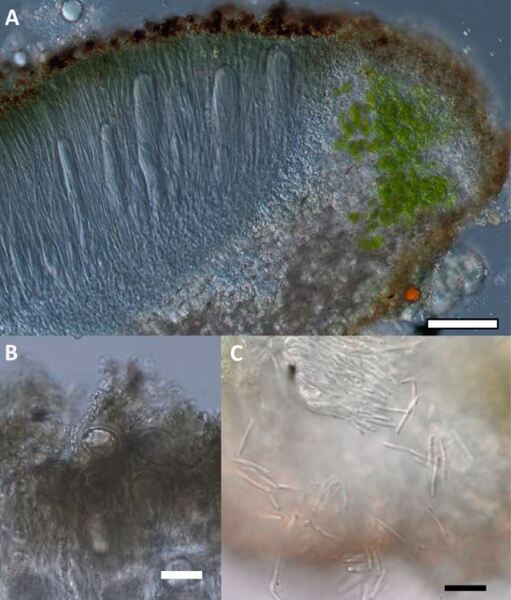Circinaria ochracea Thüs & Nascimbene
in Nascimbene & al., J. Fungi, 9,3: 9, 2023
Synonyms:
Distribution: C - Sar (Nascimbene & al. 2023).
Description: Thallus crustose, episubstratic, areolate, the areoles angular, flat, pale yellow-orange, 0.5-0.9 mm wide, 145-170 µm thick, separated by distinct cracks in dry thalli, without a distinct prothallus. Cortex 7-8 µm thick, with a yellowish- greenish grey pigment; algal layer 40-80 µm thick; medulla white, 60-85 µm thick, hydrophobic and with air-filled spaces in water-mounted sections, I-. Apothecia aspicilioid, immersed in the areoles, rounded to elongate or irregular in outline, 0.3-0.5 mm wide, with a dark disc and a barely raised margin. Exciple 45-50 µm thick, colorless; epithecium with a dark yellowish-brown pigment partly soluble in N (Caesiocinerea-green), N+ emerald green, K+ pale yellow-brown, c. 25 µm high; hymenium colourless, (123-)200-250 µm high, without oil droplets, I+ bluish; paraphyses not moniliform; hypothecium colourless. Asci (2-)4(-6)-spored, clavate, the thin outer coat K/I+ blue, the wall and apical dome K/I-. Ascospores rarely well-developed, 1-celled, hyaline, broadly ellipsoid to subglobose, 19-22 x 14-17 µm. Pycnidia black, immersed in the thallus. Conidia bacilliform to short-filiform, straight to slightly curved, 10-11 x 0.3-0.4 µm. Photobiont chlorococcoid, the cells up to 9-11 µm wide. Spot tests: cortex K- or very faintly K+ yellow (the pigment leaking in the solution), C-, KC-, P-; medulla K-. Chemistry: no lichen substances detected.Note: a recently-described species growing on siliceous rocks in the splash-zone of permanent and temporarily dry, sun-exposed stretches of Mediterranean streams in the montane belt, hitherto known only from Sardinia.
Growth form: Crustose
Substrata: rocks
Photobiont: green algae other than Trentepohlia
Reproductive strategy: mainly sexual
Periodically submerged (e.g. in creeks)
Commonnes-rarity: (info)
Alpine belt: absent
Subalpine belt: absent
Oromediterranean belt: extremely rare
Montane belt: very rare
Submediterranean belt: absent
Padanian area: absent
Humid submediterranean belt: absent
Humid mediterranean belt: absent
Dry mediterranean belt: absent

Predictive model
Herbarium samples
Growth form: Crustose
Substrata: rocks
Photobiont: green algae other than Trentepohlia
Reproductive strategy: mainly sexual
Periodically submerged (e.g. in creeks)
Commonnes-rarity: (info)
Alpine belt: absent
Subalpine belt: absent
Oromediterranean belt: extremely rare
Montane belt: very rare
Submediterranean belt: absent
Padanian area: absent
Humid submediterranean belt: absent
Humid mediterranean belt: absent
Dry mediterranean belt: absent

Predictive model
| Herbarium samples |




